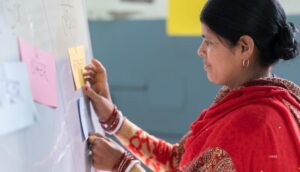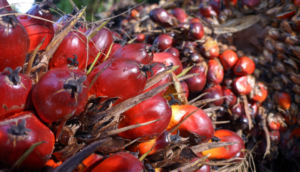Three high-level business leaders just did what others might think is too risky and counterintuitive. Joey Adler, the CEO of Diesel Canada and founder of the OnexOne Foundation; Richard Coles, the owner of Multiwear, one of Haiti’s leading apparel manufacturers; and Rob Broggi, a former hedge fund executive, created a company to demonstrate that Haiti is a source of higher priced, higher quality apparel. This shifts away from the prevailing paradigm as being only a low-cost producer of commodity garments. In 2013 they launched Industrial Revolution II, also known as IRII, a Haiti-based garment factory that while competitive, will still invest 50% of profits into its workers and their families.
The textile and apparel industry plays a critical role in Haiti’s economy. As of 2010, it employed 28,000 workers and represented 80% of the country’s exports and 10% of its GDP, according to a report of the Congressional Research Service. The earthquake that rocked Haiti in 2010 caused considerable damage to the apparel industry, with rebuilding costs around $38 million. Despite reconstruction, the focus of the Haitian industry on high volume, low-end production has resulted in low wages and poor working conditions. The tragic November 2012 fire in Bangladesh that killed 112 workers and the more recent Rana Plaza disaster that killed 1,130 workers last year, for many, underscored for many the need to change the paradigm for apparel manufacturing in the developing world and create a fairer business model in which employees, owners and consumers can share value.
Curious to see what IRII has achieved in a few short months of operations, I planned a trip to Haiti earlier this year. I wanted to see with my own eyes whether this ambitious endeavor had found a way to benefit workers at the same time that it becomes commercially viable, hoping to become a benchmark for the industry in Haiti and the rest of the region. Opportunities for the Majority (OMJ) has played a major role in this effort and supported IRII with a loan to renovate and equip a run-down industrial building in the Sonapi Industrial Park near the Port-au-Prince airport, home to much of Haiti’s apparel industry.
Opening in September 2013, IRII has already contracted 88 operators, 70%of whom are women. Instead of hiring away from other apparel manufacturers, IRII selected individuals with no prior sewing experience and put them all through an intensive three month training. What is remarkable is that for most of the employees, this is their first formal job. The training teaches them to work cross-functionally in work groups, each responsible for his/her own quality control, as opposed to a piecemeal assembly line approach. The management group of about 15 consists of Haitians and various Filipinos that have worked for many years in the Haitian textile industry. Finding skilled management, however, continues to be a major challenge in Haiti.
Highlights of the factory include several novel features:
- Lights have been installed to provide optimum conditions in the work area.
- Large ceiling fans attached to the high V-shaped ceiling create an airy, comfortable environment.
- Bathrooms are up to American standards.
- A lunchroom for employees provides a space for breaks.
- State-of-the-art sewing machines can trace out life size patterns from digital files sent by potential clients.
- A digital printer – the piece de resistance imported for the first time into Haiti – can, in a matter of seconds, print intricate patterns on T-shirts.
The production process has been designed to accommodate shorter runs with more frequent changes and multiple SKUs (stock keeping units) as demanded by the fast-paced fashion industry. IRII’s first client is an American apparel company that is a major supplier to the spiritware[1] market. Having lost its supplier in Pakistan a few months before Christmas, it was desperate to find a replacement, and IRII was able to deliver the goods. IRII has now developed some smaller ethical wear clients for whom the social aspects of IRII’s business model are important. The list of potential clients increases every month. IRII seems off to a good start and is demonstrating that economic and social sustainability are not incompatible and that it is possible to break paradigms if only the vision and will are present.
[1] Spiritware is merchandise which has been emblazoned with the logo and/or colors of an organization such as a sports team or educational institution
Rahul Desai coordinates the operations at the Inter-American Development Bank’s Opportunities for the Majority (OMJ), a unit dedicated to promote and finance commercially viable business models that target the base of the pyramid in Latin America and the Caribbean.
OMJ is a Business Fights Poverty a content partner. This blog was originally published on the IDB’s Private Sector Blog.










